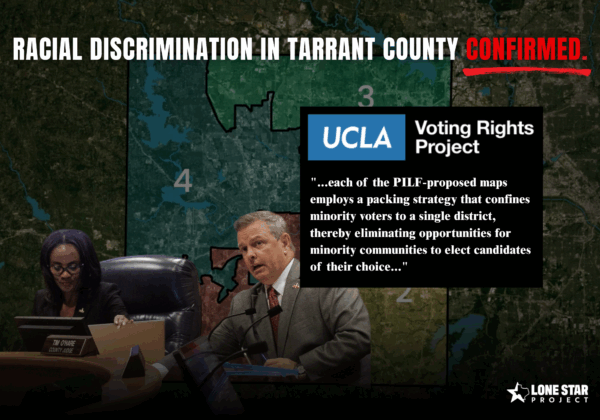
Three questions for Matt Angle about today’s SCOTUS filings
The State of Texas says in its Supreme Court briefs that it’s been trying diligently to get preclearance, but the plaintiffs point to what they say are a lot of delays in the process.
That’s right. Republicans hold every lever of power in Texas – every statewide office and strong majorities in the House and the Senate. They had unchecked control of the legislative schedule. Rather than move the Texas Primary to April, Texas Republicans kept the early March 6 primary date in place. They did not take up state house and senate redistricting until May and did not take up congressional redistricting at all during the regular session that began in January.
Instead, they waited until a special session in June to even hold a hearing on congressional redistricting and did not pass a plan until June 25. And it wasn’t until July 19 that Governor Perry got around to signing the congressional plan.
Attorney General Greg Abbott then bypassed the shorter process of seeking preclearance through the US Department of Justice and opted for the much longer process of going through the Federal District Court in Washington, DC. On two separate occasions, Abbott refused an offer by the DC District Court to conduct an early trial. Instead, Abbott filed a motion for summary judgment – which delayed the process for over six weeks.
There’s been a lot of talk about the delays and why things happened the way they did- including criticism the state’s handling of the case from people like Republican State Senator John Carona. Did the state just mess up or do you think this is part of an overall strategy?
What’s happened is exactly what Texas Attorney General Greg Abbott and the Texas Republican leadership had in mind when they planned their redistricting strategy.
By carefully orchestrating a series of legislative delays, time-consuming legal maneuvers and old-fashioned foot-dragging, the Texas GOP avoided the formal pre-clearance review required for Texas redistricting plans and have set the stage to dismantle the US Voting Rights Act.
The state’s now arguing that its maps should be used on an interim basis because there isn’t enough time to have the San Antonio court get guidance from the Supreme Court and draw new interim maps. Doesn’t that end-run section 5 of the Voting Rights Act?
Yes. Because of the delays, the state now can attack the Voting Rights Act indirectly by arguing that the federal courts must defer to State Legislative maps even when those maps have not been reviewed and found to be free of racial discrimination. If the Supreme Court agrees with the Texas Republicans, the Voting Rights Act will no longer stand as a meaningful shield to block racial discrimination in redistricting plans.
After the 2010 Census, Texas was awarded four additional congressional seats only because the Latino and African American population in the state exploded. Almost 9 out of every ten new Texans over the last decade are Hispanic or Black. If Texas had grown at only the rate of its Anglo population, the state would not have gained a single new congressional seat.
Texas Republicans have chosen to be the point in the spear that guts the US Voting Rights Act. Almost a year after release of the 2010 Census and stark confirmation that the Texas Anglo population is shrinking relative to Hispanic and African American Texans, Greg Abbott and the Texas Republican leadership have set the stage for the US Supreme Court to perpetuate Anglo Republican control.
The Texas Republican redistricting strategy has exposed their shameful decision to retain power through disenfranchisement. Rather than look at the future as an opportunity to hold power by broadening their appeal to Hispanics and African Americans, the Texas leadership has chosen a much darker and more cynical path. They are asking the US Supreme Court to turn back the clock, dismantle the Voting Rights Act and shred the fabric of social justice and racial fairness essential in our diverse state and increasingly diverse nation.
(Source: Texas Redistricting)


